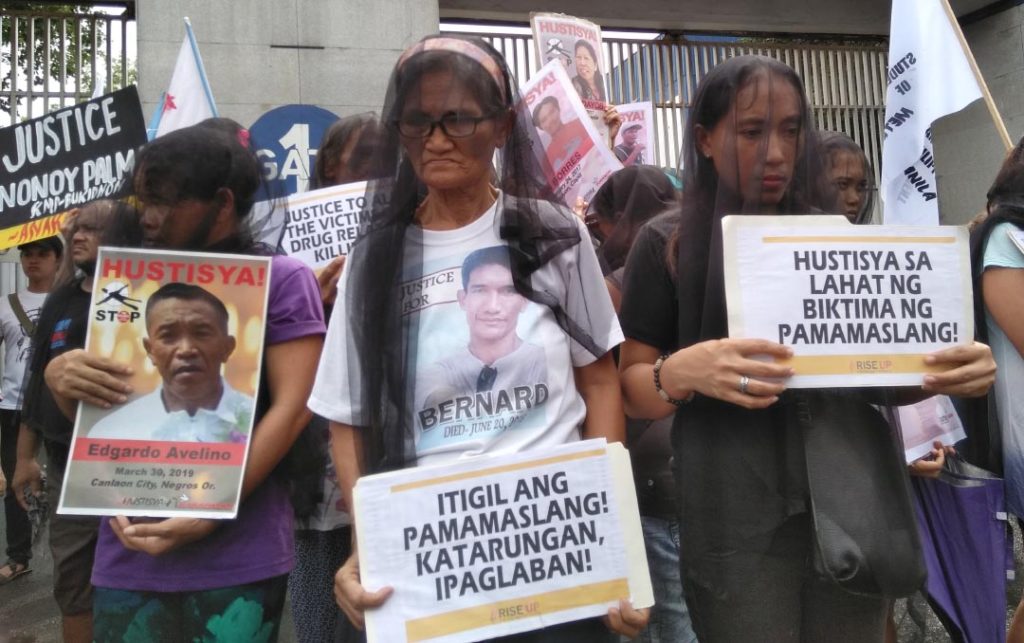While rural communities grapple with militarization, Metro Manila and other urban centers have also turned into bloodbaths due to Duterte’s so-called “war on drugs.”
By RONALYN V. OLEA
Bulatlat.com
MANILA — Heaven wept with Carmela Avelino.
The 42-year-old widow grieves the death of her husband Edgardo, one of the 14 farmers killed in synchronized police and military operations in Negros Oriental last March 30. Clutching a photo of her husband to her chest, Carmela wiped her tears as she joined relatives of other victims of human rights abuses in a protest action, July 17.
Her search for justice brought her in front of Camp Aguinaldo, headquarters of the Armed Forces of the Philippines (AFP) and then to the gates of Camp Crame, headquarters of the Philippine National Police. Her 16-year-old daughter chose to remain inside a jeepney, still traumatized by the incident. Carmela said Grace is still having nightmares, seeing in her dreams how her father was shot to death.
Marching beside Carmela was Vina Sunibyo, whose uncle Apolinario Libico was slain by suspected soldiers. Libico, a local village chieftain in barangay San Miguel, Las Navas, Northern Samar, was publicly tagged by the Philippine Army’s 20th Infantry Battalion as a New People’s Army (NPA) supporter, Sunibyo said.
Both Negros and Samar were included in President Rodrigo Duterte’s memorandum order no. 32. Signed by Duterte on November 22, 2018, the memo ordered the deployment of more troops in three provinces including Bicol purportedly to “suppress lawless violence and acts of terror.”
Human rights alliance Karapatan, however, maintained that the memorandum resulted in massive human rights violations. Karapatan documented 50 cases of extrajudicial killings in Negros and 26 in Bicol as of March this year. At least 250 were gunned down in the name of Duterte’s counterinsurgency operations, according to Karapatan.
While rural communities grapple with militarization, Metro Manila and other urban centers have also turned into bloodbaths due to Duterte’s so-called “war on drugs.”

Amy Jane Lee, whose husband Michael was killed by men riding in tandem on March 20, 2017 in Bagong Silang, Caloocan, also joined the protest. Lee told Bulatlat that her husband, a jeepney driver, was neither a drug user or a drug pusher.
“I came here for my husband, and for my children,” Lee said in Filipino. “I wouldn’t be able to bring his life back but I will continue to fight for justice.”
With three children to feed, the 36-year-old widow has been cooking and selling food in a school canteen. With the classes suspended due to the weather, Lee took the opportunity to join other members of Rise Up for Life and for Rights.
Lee’s neighbor, Rhea Nonay, 64 years old, held a photo of her youngest son. Bernard, a tricycle driver, was only 34 years old when killed on June 20, 2018 by masked men.
The families welcome the United Nations Human Rights Council resolution to investigate the killings and other abuses in the Philippines.
“At least now the world knows what is happening here. Even if the government does everything to hide the truth, the truth would surely come out,” Lee said. “We want to be heard.”
In a statement, Amihan, the national federation of peasant women, called for the scrapping of memorandum no. 32 and Duterte’s counterinsurgency program Oplan Kapanatagan.
Amihan said peasant communities from as far as Nueva Ecija, Mindoro, Negros, Samar and Bicol will march and join other sectors in United People’s SONA on July 22.
READ ALSO:
#JusticeForNegros14 | Probe reveals state security forces committed ‘murder, theft, other abuses’
The post Kin of victims of extrajudicial killings fight for justice appeared first on Bulatlat.

